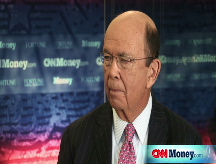The incredibly shrinking Citigroup
Shares of the troubled bank tumble on reports of a sale of the company's Smith Barney division - and some analysts warn a breakup of the banking giant could soon follow.
 |
| If Citigroup's Smith Barney asset management division is sold, other business units could soon follow, warn analysts. |

NEW YORK (CNNMoney.com) -- Investors are having a hard time finding much faith in Citigroup. The stock plunged 17% Monday, despite speculation that the financial services giant was engaged in talks to raise capital by selling a stake in its Smith Barney brokerage division to Morgan Stanley.
A deal with Morgan Stanley (MS, Fortune 500) has yet to crystallize. But a growing chorus of analysts has suggested that if one does, it could herald the first in a series of asset sales by Citigroup (C, Fortune 500) as it aims to scrap its "universal bank" business model.
"We are now in the dismantling phase," said William Smith, senior portfolio manager at SAM Advisors LLC, whose firm owns shares of Citigroup.
The New York City-based bank has come under intense pressure to consider all of its options in recent weeks.
Citigroup is expected to report a $3.8 billion loss for the fourth quarter next week, and analysts are already expecting that 2009 will be another year of red ink as the U.S. consumer and broader economy remain severely strained.
At the same time, regulators are keeping a close eye on the bank. In November, the government delivered a massive rescue package for Citigroup as it teetered on the brink of collapse, agreeing to absorb a portion of its future losses tied to more than $300 billion in assets.
Citigroup watchers agree that if the company is dismantled any further, international operations will be among the first to go.
As the credit crisis spread around the globe, Citigroup has been particularly hard hit due to its international exposure, which was once considered a strength for the bank.
Last quarter, Citigroup reported surging credit costs in both its credit card and consumer banking businesses in countries such as India and Brazil.
The bank has already trimmed some of its foreign assets. Last month, the company completed the sale of its German retail banking operations and an India-based outsourcing business called Citigroup Global Services Limited.
Some analysts suggest that Citigroup could sell Banamex, one of Mexico's largest commercial banks. However, according to a report in The Wall Street Journal this past weekend, the bank has shelved plans to sell it.
"They would like to keep it. But at the same time, it is one of their strongest international franchises and definitely a valuable unit," said Joe Scott, a senior director at Fitch Ratings who tracks the company.
Scott added that it probably would be easier for Citigroup to sell some of its international units since there should be willing buyers. But it may be trickier for Citigroup to figure out what to do with the rest of its U.S. operations.
Since Citicorp merged with insurance company Travelers in 1998 to form Citigroup, top company executives have pledged their commitment to the "universal bank" business model.
Supporters have touted Citigroup's potential as a one-stop shop for businesses and individuals needing to conduct financial transactions, and noted that having a diversified business model helps to smooth out earnings volatility.
But the company's lackluster performance, even in the pre-credit crisis days, has served as fodder for critics and shareholders alike.
Citigroup CEO Vikram Pandit has maintained his commitment to the "universal bank" model since taking over the top spot at the company last year - even as he has pushed for the company to scale back.
Last May, he unveiled a massive restructuring program, which included plans to shed more than $400 billion in assets. He followed that up in November with plans to cut more than 50,000 jobs.
While some divisions of the company continue to struggle, including the firm's investment banking business, others have remained consistently healthy and could be ripe for a sale, such as Citigroup's Primerica insurance division.
"In this environment the only thing you can sell are the good bits of the business," said Jonathan Monk, senior portfolio manager at Aerion Fund Management in London, whose firm does not own shares of Citigroup.
A more bold, though seemingly less likely approach, could be for Citigroup to try and sell its transaction services business or even its credit card unit.
Analysts are skeptical, however. For one, Citigroup's credit card division faces a bleak forecast given the current economic climate, meaning finding a buyer could be tough, notes Monk.
But maybe the biggest fear among analysts and investors is that if Citigroup sells off reliable divisions such as Smith Barney, the company risks losing a key source of profits for the future.
"There are a lot great pieces to this puzzle," said SAM's Smith. "It didn't have to be this way." ![]()


